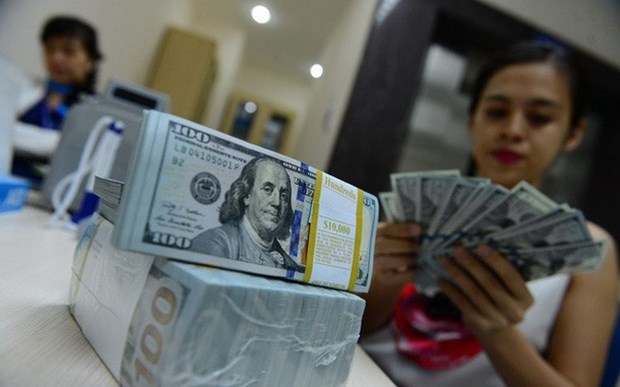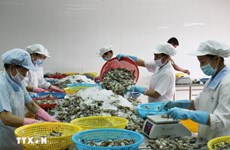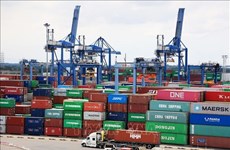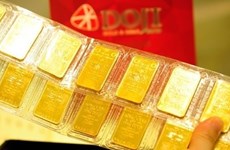Dollar hike won’t significantly affect Vietnam’s economy
The US dollar has appreciated significantly against the Vietnamese dong in the past few days, but local officials and experts believe these hikes won’t affect Vietnam’s economy in any major way.
 Illustrative photo (Source: cafef.vn)
Illustrative photo (Source: cafef.vn)Hanoi (VNS/VNA) – The US dollar has appreciated significantly against the Vietnamese dong in the past few days in the wake of the US Federal Reserves (Fed)’s interest rate hike last week, but local officials and experts are not too worried, believing these hikes won’t affect Vietnam’s economy in any major way.
On June 14, Fed decided to raise the benchmark interest rate by 0.25 percentage points while implying that from now till the end of the year, the rate could be raised two more times.
The move caused immediate impacts on the domestic market with the dollar appreciating significantly against the dong in both official and unofficial markets.
On June 20, the central bank listed the daily reference exchange rate at 22,617 VND per USD, up 15 VND from the previous day. With the current trading band of /-3 percent, the ceiling rate applied to commercial banks during the day is 23,295 VND per USD and the floor rate 21,941 VND per USD.
The VND/USD exchange rate quoted by all commercial banks also went up on June 20.
Vietcombank raised the rate by 10 VND, listing the buying rate at 22,810 VND per USD and the selling rate at 22,880 VND. Compared with the end of last week, the USD listed at Vietcombank rose by 45 VND.
The rate at BIDV was also up 10 VND, standing at 22,815 VND for buying and 22,885 VND for selling.
The same move was seen at Techcombank, which added 15 VND to buy the greenback at 22,790 VND and sell at 22,890 VND.
Despite the appreciation, the State Bank of Vietnam (SBV) said that the dollar demand and supply sources remained stable in the past days and banks had met all dollar demands of institutions and individuals.
The central bank continued net purchase of the greenback to build up the national foreign reserves, SBV said.
Nguyen Hoang Minh, deputy director of SBV’s HCM City branch, said that SBV was closely monitoring the exchange rate to timely take measures.
Commercial banks also said that the dollar had appreciated by just 0.8 percent against the dong to date this year, meaning the current rise not yet a concern.
Can Van Luc, chief economist of the Bank for Investment and Development of Vietnam, was not also concerned about the depreciation of the dong against the dollar thanks to the country’s balance in dollar supply and demands while the central bank is still applying a flexible and effective exchange rate policy.
Besides this, the record high of the nation’s foreign reserves of 63 billion USD would also support the central bank to fight against external shocks to stabilise the exchange rate, Luc said.
According to the Viet Dragon Securities Company, the devaluation of the dong against the dollar is still under the central bank’s control, predicting that the dollar could appreciate by 1.5-2 percent this year.
However, experts also suggested the central bank be cautious as besides the Fed interest hike, rising inflation and the return of a trade deficit in May in the domestic market have also put pressure on the exchange rate.
Banking expert Nguyen Tri Hieu forecast that inflation this year could exceed the threshold of 4 percent, but he believed it was acceptable for the rate to be ranged between 4 and 4.5 percent as long as the country’s GDP growth reaching 6.8 percent. "It does still need an alarm though," he said.
In its latest report, the National Financial Supervisory Committee stresses that the dollar is forecast to be on an uptrend from now to the year-end, especially while the Fed plans to continuously increase interest rate, so the central bank needs to closely watch the move of the greenback to timely make flexible adjustments.
Despite an impact on the exchange rate, experts said that the appreciation of the dollar against the dong would also benefit Vietnam’s exports.
"Local exporters receive payment in US dollars, so the appreciation of the greenback will help them make more profit," Hieu said.
Do Ha Nam, Chairman of Intimex Group, one of Vietnam’s major agriculture produce exporters, said that the dollar appreciation would be advantageous for exporting countries, especially for Vietnam that has often had a trade surplus in recent years.
The depreciation of the dong by 2-3 percent in recent years had encouraged domestic exporters and also helped the economy operate more stably, Nam said, adding however, that if the dong depreciated more than 3 percent, it would cause risks for firms that have borrowed a large amount of dollars.
As for imports, Hieu said, high dollar prices would create difficulties for Vietnamese import businesses, however, each sector would see a different impact.
Vu Duy Hai, general director of Vinacam, which specialises in fertiliser imports, said that the dollar appreciation would cause an increase in input costs for local producers and farmers, especially for products that Vietnam cannot produce, such as kalium fertiliser.
As there remains an amount of fertiliser in stockpile, Nam said that the dollar price hike would cause selling prices of fertiliser to increase in the third or early fourth quarter this year.-VNS/VNA













